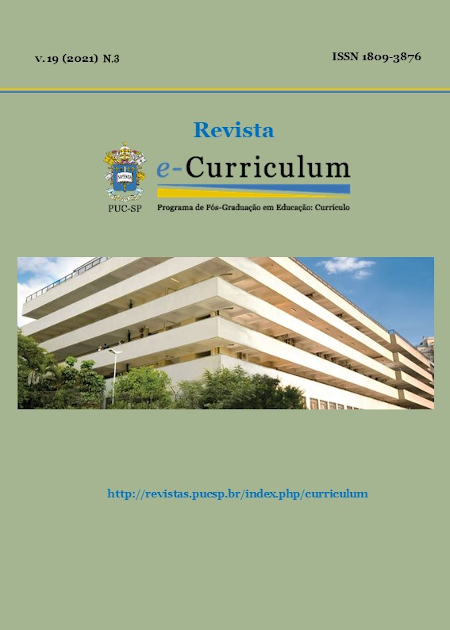La Escuela, pertenencia y la geografía como disciplina escolar
DOI:
https://doi.org/10.23925/1809-3876.2021v19i3p1222-1239Palabras clave:
Currículo, Enseñanza de la Geografía, Currículum escolarResumen
Este artículo analiza el papel de la institución escolar en la sociedad contemporánea, así como el propósito de la disciplina de Geografía en los currículos escolares. Se discute la propia escuela como institución pública, regida por el Estado, así como el currículo escolar, no solo como una forma de control, sino también como una política pública al servicio de crear la noción de pertenencia al orden mundial consistente con el modo industrial urbano. Se trata de una investigación bibliográfica sobre la institucionalización de la escuela y el currículo escolar que, a través del método materialista dialéctico, alterna escalas de análisis para vislumbrar el papel de la enseñanza de la Geografía en la creación y consolidación del nacionalismo como forma de consolidación desde la noción de pertenencia al mundo contemporáneo, marcado por la omnipresencia de los Estados Nacionales. Finalmente, presenta un aporte a la discusión curricular sobre el significado e importancia de los propósitos de la enseñanza de esta disciplina en el ámbito escolar, especialmente en lo que respecta a fortalecer el debate sobre las posibilidades en el proceso de implementación del reciente Base Nacional Común Curricular (BNCC) Brasileña.
Citas
CHIZZOTTI, Antônio; PONCE, Branca Jurema. O currículo e os sistemas de ensino no Brasil. Currículo sem Fronteiras, v. 12, n. 3, p. 25-36, 2012. Disponível em: http://www.educaretransformar.net.br/wp-content/uploads/2017/04/O-curriculo-e-o-ensino-no-Brasil.pdf. Acesso em: 13 jun. 2019.
FREIRE, Paulo. Abertura do Congresso Brasileiro de Leitura. Campinas, novembro de 1981.
GIOLITTO, Pierre. Histoire de l’enseignement primaire au XIXe siècle. II, Les méthodes d’enseignement. Paris: Nathan, 1984.
HAMILTON, David. Sobre as origens dos termos classe e curriculum. Revista Teoria e Educação, Porto Alegre, n. 6, p. 33-52, 1992. Disponível em: https://pt.scribd.com/document/347470194/TEXT0-01-CURR-Origens-Dos-Termos-Classe-e-Curriculum. Acesso em: 13 jun. 2019.
HOBSBAWM, Eric J. A era das revoluções. 34. ed. Rio de Janeiro: Paz e Terra, 2014.
LACOSTE, Yves. A geografia: isso serve, em primeiro lugar, para fazer a guerra. Campinas: Papirus, 1988.
LURIA, Alexander Romanovich. Diferenças culturais de pensamento. In: VIGOTSKII, Lev Semenovich; LURIA, Alexander Romanovich; LEONTIEV, Alex N. Linguagem, desenvolvimento e aprendizagem. 12. ed. São Paulo: Ícone, 2012. p. 39-58.
MORAES, Antônio Carlos Robert. A gênese da geografia moderna. São Paulo: Hucitec, 1987.
MORAES, Antônio Carlos Robert. Notas sobre identidade nacional e institucionalização da geografia no Brasil. Revista Estudos Históricos, v. 4, n. 8, p. 166-176, 1991. Disponível em: https://bibliotecadigital.fgv.br/ojs/index.php/reh/article/view/2322. Acesso em: 5 abr. 2019.
MORAES, Antônio Carlos Robert. Geografia: pequena história crítica. 20. ed. São Paulo: Annablume, 2005.
MOREIRA, Ruy. A geografia serve para desvendar máscaras sociais. In: MOREIRA, Ruy. (org.). Geografia, teoria e crítica: o saber posto em questão. Petrópolis: Vozes, 1982. p. 33-63.
RIBEIRO, Guilherme. Luta pela autonomia e pelo território: geografia e os estados alemão e francês na virada do século XIX ao século XX. Revista Mercator, Fortaleza, v. 8, n. 15, p. 19-28, 2009. Disponível em: http://www.mercator.ufc.br/mercator/article/view/255. Acesso em: 22 maio 2019.
SANTOS, Douglas. A reinvenção do espaço: diálogos em torno da construção do significado de uma categoria. São Paulo: Unesp, 2002.
THOMPSON, Edward Palmer. Costumes em comum. São Paulo: Companhia das Letras, 1998.
TORRES SANTOMÉ, Jurjo. Currículo escolar e justiça social: o cavalo de Troia da educação. Porto Alegre: Penso, 2013.
Descargas
Publicado
Cómo citar
Número
Sección
Licencia
Derechos de autor 2021 Revista e-Curriculum

Esta obra está bajo una licencia internacional Creative Commons Atribución 4.0.
Os autores concedem à revista todos os direitos autorais referentes aos trabalhos publicados. Os conceitos emitidos em artigos assinados são de absoluta e exclusiva responsabilidade de seus autores.Todo o conteúdo da Revista e-Curriculum é aberto para acesso público, propiciando maior visibilidade, alcance e disseminação dos trabalhos publicados.











